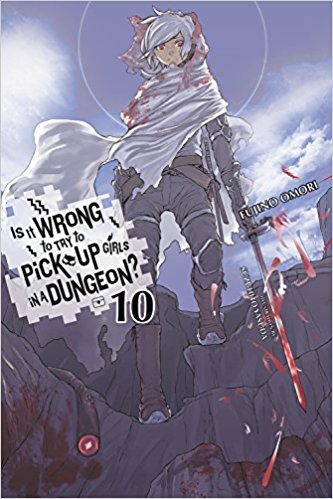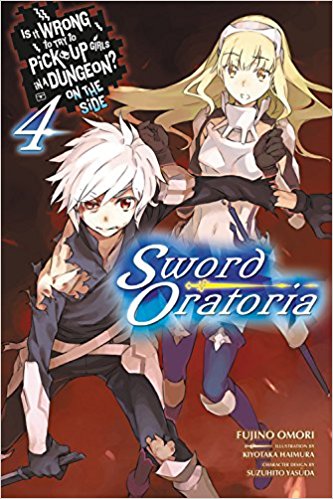By Fujino Omori and Suzuhito Yasuda. Released in Japan as “Dungeon ni Deai o Motomeru no wa Machigatte Iru Darou ka? Gaiden – Sword Oratoria” by Softbank Creative. Released in North America by Yen On. Translated by Liv Sommerlot.
Jealousy tends to be pervasive in the DanMachi series. Some of it stems from people being jealous of Bell’s power and the time he took to achieve it – Aiz falls into this category best. But sometimes it’s simply “I am in love with this person and have not confessed but am simply pining for them, and how DARE they look at that other person and not me?”. It’s very common, very ugly, and very realistic. That said, authors who write it into their series almost always expect readers to be amused by the antics of the jealous person, and in reality I tend to find that the reader ends up thoroughly pissed off instead. I’m not just talking about others here – Hestia’s jealousy of anyone coming near Bell is one of her biggest faults, and I don’t like the author hammering on it. The same applies to Lefiya in this side series. Unfortunately, this volume has few fights and a lot of jealousy.
Most of this 5th volume of Sword Oratoria aligns with the 5th volume of the main series, meaning we’re on the 18th Floor and having a rest. Loki’s team is coming back from their attempt on the 59th floor from the last book; Bell and company are coming down from their own disastrous mission. Aiz takes something of a backseat here, though there is some interesting discussion of her background and possible origins now that the Loki team can use Bell as a walking Wikipedia, as he’s read and memorized the most detailed and unexpurgated version of the myths and legends they all know. There’s also an amusing reminder that most of the elves we’ve dealt with in this series are not your typical sort, and that the proud, haughty elf is meant to be the norm. And of course we get the “backside” to all the DanMachi scenes from Book 5, including Hestia’s arrival (though the Loki cast leaves before the rest of that book happens.)
But most of what the reader will focus on is Lefiya’s insane jealousy of Bell, which goes up to eleven in this book and also gets them into big trouble when she chases after him in such a rage that they both get lost in the middle of the vast floor forest. These scenes are meant to show Lefiya that Bell is not the evil lothario she might expect him to be – inde3ed, like Aiz, she’s started to boggle in disbelief at how skilled he has gotten in such a short time. They also do work together well when pressured to, and Lefiya is able to forego her jealousy in a crisis. Still, I’m going to be honest, Lefiya’s obsession with Aiz is bad for her character. I thin k the author knows this, which is why she’s playing up Lefiya’s relationship with Filvis as well, which is far healthier and more grounded in mutual admiration and respect.
I think this is overall a volume with more positives than negatives, and of course there is also development of Sword Oratoria’s main plot with the Evils. If you are a Danmachi reader who dislikes “girl is jealous of other girls getting along with her crush” stories, though, be advised this volume wallows in it.





